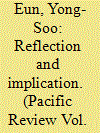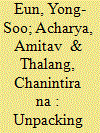| Srl | Item |
| 1 |
ID:
186122


|
|
|
|
|
| Summary/Abstract |
This article elaborates on the following two questions and their implications. First, how can we as analysts offer compelling explanations for weak states’ agency and behaviours in the current global political and economic environments marked by multiplicity and fluidity? Second, what are the major causal factors that enable or influence weak actors’ agency, and under what conditions is their agency facilitated or constrained? Although an extensive literature in the discipline of International Relations (IR) confirms that today’s world is highly complex and diverse in terms of who or what matters in global politics, the subject of weak states and their agency is still not adequately discussed. Furthermore, the issues of methodology and theorising for the subject remain uncharted territory. By reflecting upon the main arguments and empirical findings of our special issue, this concluding article makes a case for ‘open-ended’ analytic eclecticism as an alternative methodological/analytical scheme, and lays preliminary ground for theorising weak states’ agency in the changed and changing global environments in the twenty-first century.
|
|
|
|
|
|
|
|
|
|
|
|
|
|
|
|
| 2 |
ID:
186109


|
|
|
|
|
| Summary/Abstract |
This introductory article provides rationales and contextual background for the special issue which examines how weak states in Asia actualise and exercise their agency in the twenty-first century regional or global environments. The article opens with a consideration of why attention is drawn to the agency of the weak. Weak states are often treated as ‘objects’ of international politics rather than ‘subjects’, and their foreign policy actions are commonly taken to be ‘reflexive’ of external constraints, such as fluctuations in the balance of power in the international system. We disagree with this view. We argue that weak actors can demonstrate varieties of agency regardless of their position in the international system in terms of material capabilities. To clarify this point, the article reflects on the changed and changing global and regional environments and order. Rather than seeing them through the lens of great power politics and its signature concept of ‘polarity’, the article offers an alternative notion, namely a ‘multiplex’ world, and identifies the key nature of order therein: multiplicity and fluidity. Both material and normative power have already and continue to become fragmented, decentralised, and dispersed within and across states. While emphasising that such a multifaceted and fluid world opens up a wide avenue of agency for weak actors, this article also notes that the weak has varieties of agency as potentials.
|
|
|
|
|
|
|
|
|
|
|
|
|
|
|
|